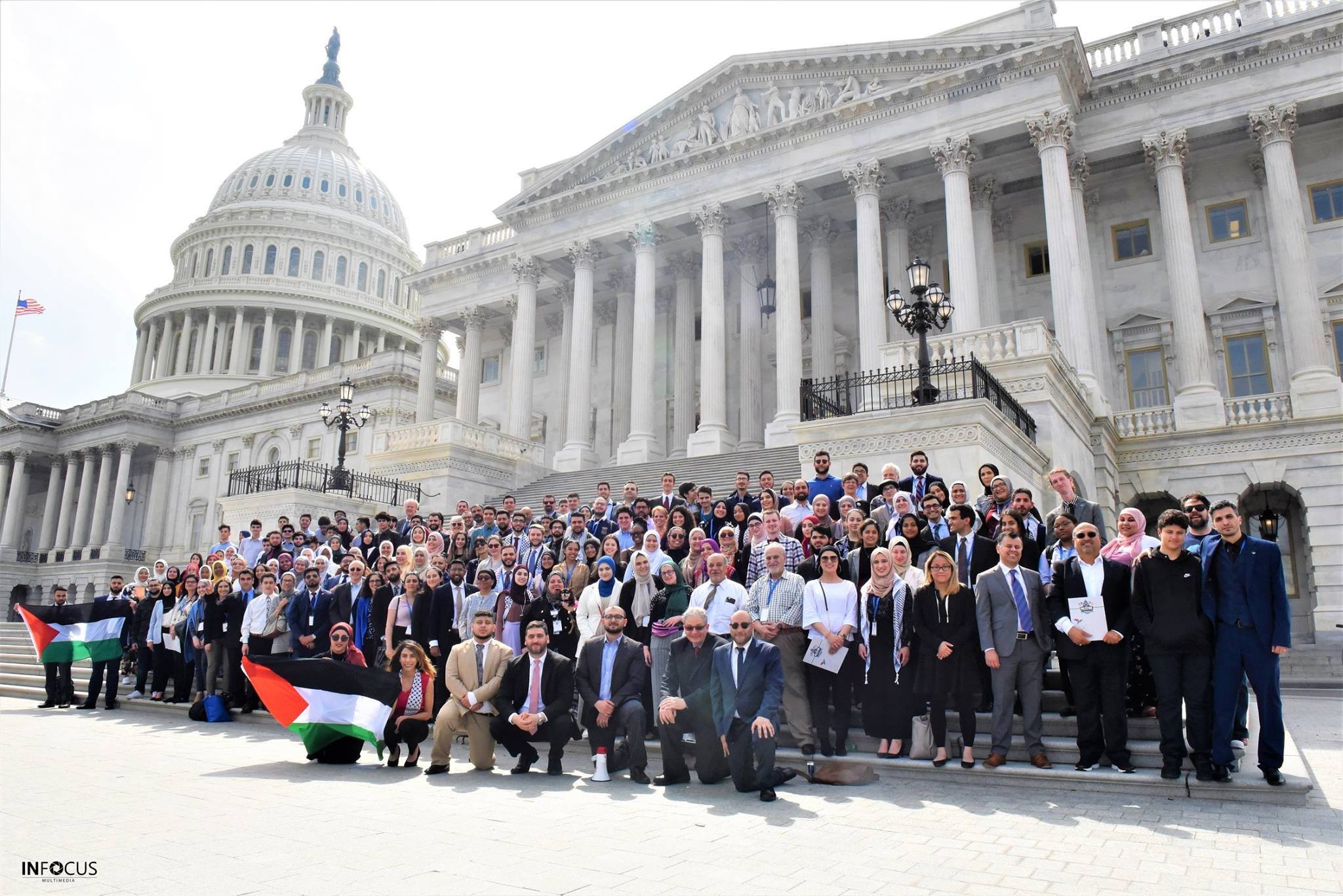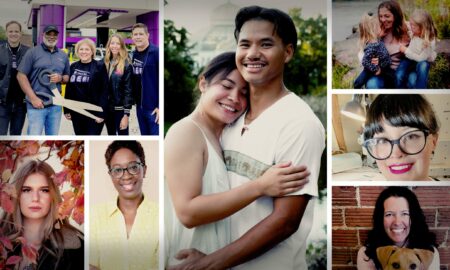
Today we’d like to introduce you to Sana Wazwaz.
Hi Sana, so excited to have you on the platform. So before we get into questions about your work-life, maybe you can bring our readers up to speed on your story and how you got to where you are today?
Despite being born and raised in the US, I became known as “the Palestine kid” in school. No, I mean literally–one kid had me mistakenly listed in his contacts as “Sana Palestine” for the longest period of time because of how much I wouldn’t shut up about it. I’d ramble on about Palestine during random class discussions. I’d walk around and preach the latest Palestine news to students. I’d met with the social studies department about Palestine curriculum change. I had this drive to assert the Palestinian story in any way that I could.
None of this was out of performance, but a necessity. Palestinians in the diaspora learn from a young age that their country is not on the map; that their country is not considered a country. We learn that this is because our country was colonized; upwards of 750,000 Palestinians were expelled to pave for Israel’s creation in 1948. We learn about colonialism before kids are “supposed to,” because really, we had no other choice. Ignorance is a luxury. We the stories of our parents and grandparents living under a brutal military occupation, and see the news headlines whitewash it away and treat our dead as “political.” Being consistently erased does something to you. As a young Palestinian, I developed this ambassador status–this feeling like it’s it was my responsibility to keep Palestine’s memory alive. From there, I felt like I had to use every outlet I could to raise awareness, for it became my biggest passion.
I then attended my first American Muslims for Palestine (AMP) National Conference at age 11–and it was then that I set my eyes on one day joining the team. AMP is a national grassroots advocacy organization which aims to uphold Palestinian human rights. It was at that conference that I found myself surrounded by hundreds of dedicated and incredible advocates who were likewise, “too passionate,” and beautifully so. I had learned Palestine history in detail for the first time there, and couldn’t stop rambling about my newfound knowledge on the ride home from Chicago.
The Minnesota chapter was revived in 2018 after being relatively inactive for several years. I thought AMP-MN was made up of literal legends. These guys were on fire; meeting with the State Board of Investments, holding youth summer camps, presenting at schools–you name it. I actually was part of their first cohort of their Youth for Palestine program, and getting to work with them more closely made me admire their work even more.
I told myself I’d “one day join the team,” but I hadn’t realized to myself that this “one day” could be right after I graduated high school. It was the summer of 2020, when, you know, all hell had broken loose, but on top of the obvious hell known as the pandemic, Israel had announced that it would be annexing parts of the Palestinian West Bank. Naturally, everyone was feeling powerless, and now “Sana Palestine,” was stuck at home with this boiling frustration and no outlet to express it all. I was so overwhelmed with the injustice that I banned the word “Palestine” from being mentioned in our house. I didn’t want to be reminded of it all. After one day going off on a tearful rant about the injustices being committed, I realized I had to do something about my drive to advocate. I picked up my phone and texted AMP-MN to ask if I could join the team. They interviewed me in early July to learn of my qualifications, and I was welcomed into the group a week later, and the rest is history.
I have served on the board of AMP-MN since July 2020, and I haven’t looked back since.
I’m sure you wouldn’t say it’s been obstacle free, but so far would you say the journey have been a fairly smooth road?
It has definitely not been smooth; there have been many struggles. There’s one that really jumps out at me: For the first year after I joined the group, I had debilitatingly bad imposter syndrome that was hindering my ability to organize. It was so severe that at several points, I thought of quitting the group. When you’re working on an issue that you feel is bigger than yourself; when you’re working in the organization you see as groundbreaking; when you’re organizing alongside such incredible leaders, you start to feel you’re not worthy of your position.
Perfectionism and anxiety have been major themes throughout my life, however, I think about how Palestinian identity influenced this self-scrutiny within AMP specifically. When you see your narrative being so scarcely represented, you naturally begin to feel like you “can’t let your cause down.” Add to that the fact that I was fresh out of high school when I joined the group, and those I worked with were several years older and thus had much more organizing experience than me. It was a recipe for chronic rumination–dwelling on every typo, re-thinking every discussion contribution, doubting everything.
Through lots of self-reflection, I slowly (and I mean very slowly) realized multiple things: There’s no time to keep doubting yourself when you have a country to free. Imposter syndrome was counterproductive; in an attempt to improve my organizing, all the self-scrutiny actually killed it. I not only became extremely unproductive, but my focus shifted from freeing Palestine, to a constant self-battle to prove I was “good enough.” Not that I became insincere–of course Palestine always mattered to me genuinely. But when you’re spending so much time spiraling, you start to internally divert focus from the real reason you began organizing in the first place.
Palestine needs all of its voices across the generations, because we all have a valuable perspective to bring. I don’t have to be a perfect organizer. That’s not what Palestine needs. Part of freeing Palestine is countering the dehumanizing pressure on Palestinians to be perfect ambassadors for their narrative. Part of freeing Palestine is letting Palestinians just be human.
Can you tell our readers more about what you do and what you think sets you apart from others?
Our organization, American Muslims for Palestine (AMP), is one of the largest Palestine advocacy organizations in the US. AMP advocates for an end to Israel’s illegal occupation, the right for Palestinian refugees to return to their homes, and for an end to Israel’s ethnic cleansing of the Palestinian people. AMP-MN serves the Minnesota Muslim and general American communities through multiple initiatives. These include educational events; for example, we also offer Palestine presentations to school classrooms, colleges, organizations, and other institutions that would like to learn more about the cause (so if you’d like to request a presentation, reach out ) We also organize youth programs, protests, and grassroots campaigns to boycott Israeli companies that are complicit in ethnic cleansing.
My personal specialty throughout my work is anything that involves educational presentations. Presenting and performing liberates me; the adrenaline, the feeling of captivating an audience, the feeling of power when the stage is yours. Whereas I’ve struggled with feeling voiceless all my life, there is no place that allows me to feel more whole than when I’m standing before an audience and telling a story–especially the erased story of Palestine. Presenting gives me the opportunity to do such a powerful thing–to take back that story.
Particularly, I have a special passion for presentations which empower young Palestinians to do the same, for it is easy to feel powerless. Personally, I’ve had history teachers try to lecture me on what my own parents lived through. I’ve been told numerous times that I have to tone down my passion for Palestinian liberation and “see both sides,” as if there is any moral equivalency between the military occupier and the occupied population. Furthermore, the rhetoric that “Israel is defending itself” when it massacres entire villages is so well-ingrained in American discourse. Young Palestinians like myself can feel enormous pressure to challenge it all. Like we need all the juiciest facts ready to go and the perfect speaking style to constantly convince the world that there are no “two sides”–one side is disproportionately bombing civilians, and that is unquestionably wrong.
I’ve thus made it a point to give several presentations to our youth to empower them through the process of telling this story–to make it feel rewarding rather than burdensome. My favorite presentation was on learning the facts to counter prominent Zionist myths.
During my debate strategy presentation, I was going to play a Zionist and the students were going to mock-debate me. They were extremely intimidated at first. Super nervous. But I asked them, “what are you nervous about?” Responses were like, “I get intimidated,” “I’m gonna blank and forget something,” “what if you stump us?” So I said, “listen; if you’re not confident in yourself, we can deal with that later. But you’re confident in your story even if you’re not confident in yourself, right? Lean into that. Own your story; trust your story; and that’ll help you trust yourself.”
Several months later, our youth participants told me a few days ago that this still impacted her. To this day, this presentation was amongst the ones I’m most proud of. My hope is that she will take what she learns to impact someone else, just as AMP impacted me when I was 11 years old.
Can you share something surprising about yourself?
So many people are surprised to know that I’ve never actually lived in Palestine, and yet I’ve dedicated my life to it! I feel compelled to protect the homeland I’ve never lived in, and hope to live there one day when it is liberated and free.
Contact Info:
- Email: [email protected]
- Instagram: https://www.instagram.com/amp_mn/?hl=en
- Facebook: https://www.facebook.com/ampminnesota/
- Twitter: https://twitter.com/amp_mn
- Other: medium.com/@ampminnesota



















